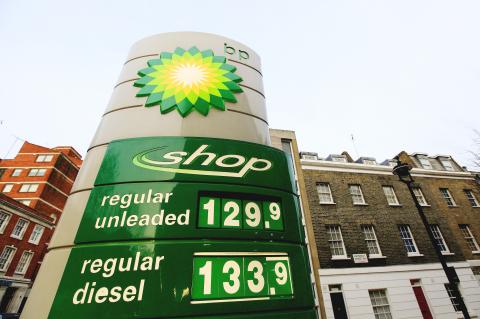BP PLC, Europe’s second-biggest oil company, reinstated the dividend that was suspended after the Gulf of Mexico spill as higher oil prices lifted earnings.
The company will pay a dividend of US$0.07 a share for the last three months of last year after canceling the payout for the first three quarters of the year. That compared with US$0.14 before the spill. It plans to sell its Texas City and Carson refineries by the end of next year.
CEO Robert Dudley is seeking to extend BP’s 60 percent share-price recovery since June following the worst spill in US history that cost his predecessor, Tony Hayward, his job.

Photo: Reuters
The company has shored up finances by raising US$22 billion from asset sales and agreed to a US$8 billion share swap with OAO Rosneft to give it access to untapped Russian reserves in the Arctic Kara Sea.
NET INCOME
Fourth-quarter net income was US$5.6 billion, compared with US$4.3 billion in the year-earlier period, the London-based company said in a statement in London.
Exxon Mobil Corp, the world’s largest company, on Monday reported its highest quarterly profit in more than two years of US$9.25 billion.
BP announced the restoration of the dividend even after its billionaire partners in TNK-BP voted to block the Russian joint venture’s US$1.8 billion dividend while it disputes the Rosneft deal. TNK-BP accounts for a quarter of BP’s output and a fifth of its reserves.
In October, BP agreed to sell operations in Vietnam and Venezuela to TNK-BP for US$1.8 billion. BP pledged to sell as much as US$30 billion of assets to help cover costs from the spill and the US$20 billion fund set up with US President Barack Obama to compensate victims. Kenneth Feinberg, who is administering the fund, said in a Dec. 31 Bloomberg Television interview that US$10 billion may be “more than enough to pay all the claims.”
BP took charges totaling US$40 billion in the second and third quarters to account for the cost of the Gulf spill.
HIGHER PRICES
BP’s earnings were bolstered by higher oil prices and improved refining margins. Brent futures have gained more than 25 percent since the start of last year. BP’s Global Indicator Margin, a broad measure of refining profitability, averaged US$4.64 a barrel in the fourth quarter, up from US$1.49 in the year-earlier period.
Upon taking the helm on Oct. 1, Dudley split the exploration and production division into three, ousting executive director Andy Inglis in the process, and created an independent safety division.
He reiterated that the company won’t turn its back on the US after the spill, where the Gulf of Mexico accounts for about a tenth of BP’s global production.

CAUTIOUS RECOVERY: While the manufacturing sector returned to growth amid the US-China trade truce, firms remain wary as uncertainty clouds the outlook, the CIER said The local manufacturing sector returned to expansion last month, as the official purchasing managers’ index (PMI) rose 2.1 points to 51.0, driven by a temporary easing in US-China trade tensions, the Chung-Hua Institution for Economic Research (CIER, 中華經濟研究院) said yesterday. The PMI gauges the health of the manufacturing industry, with readings above 50 indicating expansion and those below 50 signaling contraction. “Firms are not as pessimistic as they were in April, but they remain far from optimistic,” CIER president Lien Hsien-ming (連賢明) said at a news conference. The full impact of US tariff decisions is unlikely to become clear until later this month

With an approval rating of just two percent, Peruvian President Dina Boluarte might be the world’s most unpopular leader, according to pollsters. Protests greeted her rise to power 29 months ago, and have marked her entire term — joined by assorted scandals, investigations, controversies and a surge in gang violence. The 63-year-old is the target of a dozen probes, including for her alleged failure to declare gifts of luxury jewels and watches, a scandal inevitably dubbed “Rolexgate.” She is also under the microscope for a two-week undeclared absence for nose surgery — which she insists was medical, not cosmetic — and is

GROWING CONCERN: Some senior Trump administration officials opposed the UAE expansion over fears that another TSMC project could jeopardize its US investment Taiwan Semiconductor Manufacturing Co (TSMC, 台積電) is evaluating building an advanced production facility in the United Arab Emirates (UAE) and has discussed the possibility with officials in US President Donald Trump’s administration, people familiar with the matter said, in a potentially major bet on the Middle East that would only come to fruition with Washington’s approval. The company has had multiple meetings in the past few months with US Special Envoy to the Middle East Steve Witkoff and officials from MGX, an influential investment vehicle overseen by the UAE president’s brother, the people said. The conversations are a continuation of talks that

Alchip Technologies Ltd (世芯), an application-specific integrated circuit (ASIC) designer specializing in artificial-intelligence (AI) chips, yesterday said that small-volume production of 3-nanometer (nm) chips for a key customer is on track to start by the end of this year, dismissing speculation about delays in producing advanced chips. As Alchip is transitioning from 7-nanometer and 5-nanometer process technology to 3 nanometers, investors and shareholders have been closely monitoring whether the company is navigating through such transition smoothly. “We are proceeding well in [building] this generation [of chips]. It appears to me that no revision will be required. We have achieved success in designing